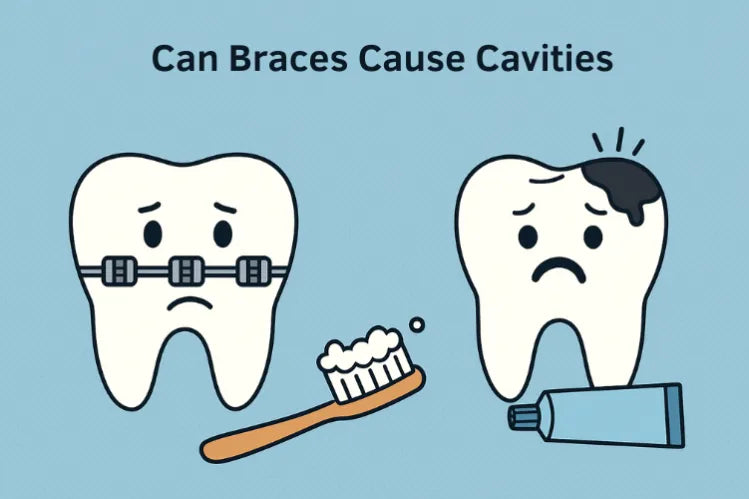
Tabla de contenido
- ¿Los brackets aumentan el riesgo de caries?
- Problemas dentales comunes durante el tratamiento con brackets
- Consejos de cepillado para usuarios de brackets
- Prevenir las caries con brackets: hábitos diarios que funcionan
- ¿Quieres libertad? Considera los alineadores transparentes ALIGNERCO
- Manténgase comprometido con la higiene bucal con brackets
- Preguntas frecuentes
Para muchas personas, usar ortodoncia es un paso importante para lograr una sonrisa más recta y saludable. Pero con este proceso Surge una preocupación común: ¿pueden los brackets causar caries? La respuesta simple es que posiblemente no, pero corres un mayor riesgo. riesgo si no se toman las precauciones necesarias.
La ortodoncia exige más a tu rutina de higiene bucal. Este artículo te guiará para mantenerla. con aparatos ortopédicos y prácticas estándar para garantizar que sus dientes permanezcan lo más limpios y saludables posible durante todo el curso de su tratamiento de ortodoncia.
¿Los brackets aumentan el riesgo de caries?
Es importante abordar el verdadero problema: los aparatos ortopédicos y el riesgo de caries van de la mano, pero no porque los aparatos ortopédicos causan caries directamente. En cambio, los brackets crean áreas pequeñas y difíciles de alcanzar, que se convierten en pequeños rincones para limpiar. Cuando La placa y las partículas de comida permanecen en estos lugares secretos, las bacterias prosperan y eventualmente provocan caries o encías. inflamación.
Además, este metal actúa como un imán para la placa. Por eso, una rutina de cuidado bucal estándar... no será suficiente. Los brackets requieren mucha más concentración y diligencia.
Problemas dentales comunes durante el tratamiento con brackets

El uso de aparatos ortopédicos es un compromiso, no solo para enderezar los dientes, sino también para prevenir los efectos secundarios que conlleva. Mala higiene. Algunos problemas dentales comunes durante el tratamiento con ortodoncia incluyen:
Acumulación de placa y gingivitis
Cuando la placa no se elimina adecuadamente, irrita las encías, causando hinchazón, sangrado o enfermedad de las encías en etapa temprana.
Daños en el esmalte dental causados por los aparatos ortopédicos
La exposición constante a los ácidos de la placa puede erosionar el esmalte, especialmente alrededor de los brackets.
Desmineralización y manchas blancas
Las marcas blancas calcáreas suelen aparecer como un signo temprano de pérdida de esmalte, que es irreversible y permanente si no se trata.
Consejos de cepillado para usuarios de brackets
Los buenos hábitos de cepillado son tu primera línea de defensa contra las caries. Aquí tienes algunos consejos prácticos para el cepillado. para que los aparatos maximicen su esfuerzo durante este tiempo:
- Los aparatos dentales atrapan la comida fácilmente, por lo que cepillarse los dientes tres veces al día es lo ideal.
- Utilice un cepillo de dientes eléctrico , ya que ayuda a limpiar alrededor de los brackets de manera más eficiente que el manual. cepillos.
- Pruebe los cepillos interdentales y los irrigadores bucales. Estas herramientas pueden llegar entre los alambres y debajo de los brackets, donde los cepillos de dientes regulares... luchas con el hilo dental
- Incline el cepillo a 45 grados para limpiar completamente por encima y por debajo de cada soporte.
Prevenir las caries con brackets: hábitos diarios que funcionan
El cepillado es vital para prevenir las caries con brackets, pero aquí está el resto de tu rutina:
- Debes limitar los bocadillos azucarados y las bebidas ácidas. Los alimentos pegajosos son aún más problemáticos.
- Utilice un enjuague bucal o pasta de dientes con flúor para fortalecer el esmalte y combatir la caries prematura.
- Programe visitas dentales regulares para detectar cualquier problema de manera temprana.
¿Quieres libertad? Considera los alineadores transparentes ALIGNERCO

Los aparatos tradicionales son mucho trabajo cuando se trata de higiene bucal; por lo tanto, los alineadores transparentes como los que ofrece ALIGNERCO es una alternativa mucho más fácil de manejar. Facilitan el cepillado, el uso del hilo dental y la alimentación, ya que son... Son extraíbles y no requieren limpieza alrededor de los brackets y alambres.
Como puedes quitártelos durante las comidas y la limpieza, el riesgo de sufrir caries y deterioro dental se reduce enormemente. Además, el ALIGNERCO claro Los alineadores son extremadamente asequibles y discretos, a la vez que previenen la acumulación de placa y la erosión del esmalte, dos Problemas dentales comunes durante el uso de aparatos ortopédicos.
Manténgase comprometido con la higiene bucal con brackets
Entonces, ¿los brackets causan caries? En realidad no, a menos que uno se lo permita. Los brackets son un dispositivo poderoso cuando se desea... Lograr una sonrisa hermosa, pero sin duda conlleva una responsabilidad adicional. Sin embargo, con un cuidado constante, Con hábitos de cepillado adecuados y utilizando los productos adecuados, se pueden evitar la mayoría de los problemas dentales.
Al final, la higiene bucal con brackets es una cuestión de compromiso. Un pequeño esfuerzo extra cada día salvará tu salud. dientes de posibles caries, decoloración y daños irreversibles. Ya sea que elija brackets tradicionales o transparentes alineadores de marcas como ALIGNERCO, lo más importante es comprometerse a mantenerlo saludable tanto durante Tratamiento y despues.
Preguntas frecuentes
1. ¿Es normal tener caries después de la ortodoncia?
Sí, pero los brackets no causan caries. Pueden dificultar la limpieza, aumentando el riesgo de caries.
2. ¿Los aparatos ortopédicos pueden causar problemas más adelante en la vida?
Si bien los aparatos ortopédicos son seguros y efectivos, pueden causar problemas como reabsorción radicular y problemas en las encías. por una mala higiene y porque los dientes se mueven hacia atrás si los retenedores no se usan correctamente.
3. ¿Los brackets dañarán los empastes?
No, los aparatos ortopédicos generalmente no dañan los empastes si están bien colocados y en buenas condiciones.
Citas:
Noticias Médicas. (29 de diciembre de 2022). Riesgos de la ortodoncia. https://www.news-medical.net/health/Riesgos-de-los-aparatos-dentales.aspx
Talic, NF (2011). Efectos adversos del tratamiento de ortodoncia: Una perspectiva clínica. The Saudi Dental Journal, 23(2), 55–59. https://doi.org/10.1016/j.sdentj.2011.01.003
Colgate. (23 de mayo de 2024b). Prevención de la caries dental con aparatos dentales. https://www.colgate.com/es-es/salud-bucal/ortodoncia-temprana/prevencion-de-caries-con-frenos
Higuera, V. (18 de mayo de 2023). Caries dental. Healthline. https://www.healthline.com/find-care/articles/dentists/tooth-cavities







